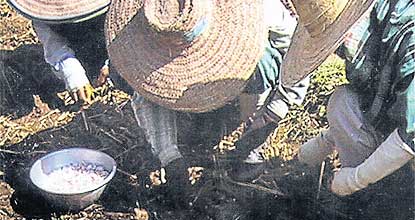Once upon a time anthropologists did "village studies". They found a place that became "their village." They counted the houses, traced the kin relations, described farming systems, and analysed the rituals.

THAILAND’S POLITICAL PEASANTS Power In The Modern Rural Economy By Andrew Walker University of Wisconsin Press. ISBN 978-0-299-28824-2 1,156 baht
Then, suddenly, village studies became unfashionable. Anthropologists went off to study borders, migrants, spirit mediums, identities.
Classic village studies all but disappeared. Until this book.
Andrew Walker's village, the subject of Thailand's Political Peasants, is a community of 130 households in the west of Chiang Mai province. It is not a village in the old sense. The families grow rice, maize, and garlic, but they make most of their livelihood elsewhere. About a quarter have a business. Two-fifths do some work for government. A third have a family member working in Bangkok or farther afield.
Walker's point is that rural society has been transformed over the past 30 years, and he uses statistics to show this transformation has been nationwide. He highlights two processes. First, everyone has gotten much richer, with "levels of household income and consumption unthinkable a few decades ago". Only a few remain poor while 60 to 80% of villagers can now be classified as "middle income" in the different regions.
Second, government in the past was an oppressor taxing the villages and pushing them about, but now it is a patron. State funds flow into the village as crop subsidies, construction projects, jobs, welfare, and development schemes. Villagers spend almost as much time on "projects", meaning various ways to tap this inflow, as they do weeding their garlic.
These two changes have converted villagers into what Walker terms "political peasants". Prosperity has endowed them with new needs and aspirations.
Dealing with the power and patronage of the state is key to fulfilling those needs and aspirations. While Thai villagers were once believed to be remote from politics, and some imagine that still to be true, Walker is bent on exploding that notion for ever.
But the new rural politics has its own unique character. Walker suggests that a good way to understand this character is to appreciate how villagers deal with the gods and spirits that determine good and bad fortune in everything from health to harvest. These spirits must be seduced by offerings and flattered with rituals so that their considerable powers are tamed and directed to benign ends.
Bureaucrats, politicians and big agribusiness groups are much the same. They have powers that can either bring good or do harm. They must be seduced by offerings and flattered with rituals too. This means courting the locally powerful, but also becoming involved in electoral politics in the locality, province and nation.
"The central element in the political strategy of this middle-income peasantry is to weave the power and resources of the state into the economic and social fabric of village society."
Walker borrows the term "political society" to describe the result. In contrast to "civil society" which is full of rules and institutions, political society is all about connections, manipulation, bargaining, deals, expediency _ a kind of free-for-all, more like all-in wrestling than rule-bound Olympic boxing.
Of course, Walker is not so interested in describing "his" village as explaining the upsurge of mass politics that has marked the past decade. He suggests that Thaksin Shinawatra succeeded because he grasped the nature of this new political society, and responded to its demands for patronage and its requirements of political style. Walker traces how his villagers evaluated Thaksin and his local party candidates through the elections of the 2000s, scoring them for their connections to the locality, administrative ability, and balance between corruption and competence _ in short, their capacity to deliver.
The urban middle class has been shocked by the vitality of this new rural politics and by its rough-and-ready style. There have been attempts to block its rising importance by coup and court case, and to undermine its legitimacy by portraying villagers as venal, ignorant, and unfit for democracy. Walker suggests these attempts are deluded and doomed. The new regime of state subsidies tends to sustain the rural economy rather than transform it into something more emphatically capitalist and urban. As long as that remains true, the rural political society seems here to stay.
This is the first book-length attempt to portray the social revolution behind Thailand's new politics. It's clear, cogent, readable, and often funny. Walker teaches at the Australian National University and is maybe best known as a co-founder of the New Mandala blog.
Possibly the story would look a little different if told from the perspective of the northeast or the migrant communities of the capital or even Chiang Mai city. Possibly the term "peasant" is misleading. Possibly Walker focuses too much on economic variables to the almost complete exclusion of the cultural dramas of politics. But there is no doubt this book is a landmark that will be required reading for anyone trying to understand Thailand's new politics, and a stimulus for debate and controversy for some time to come.

